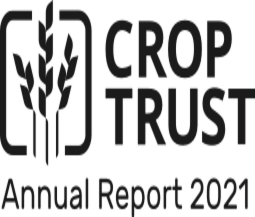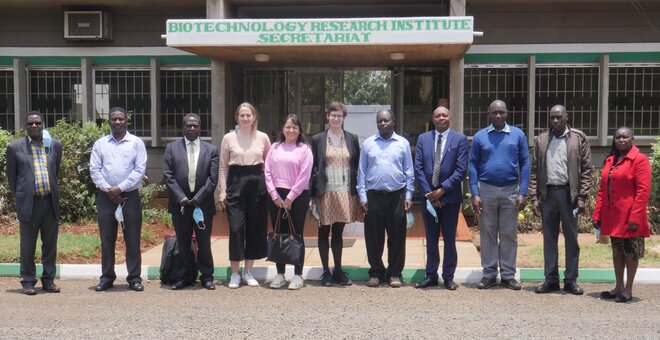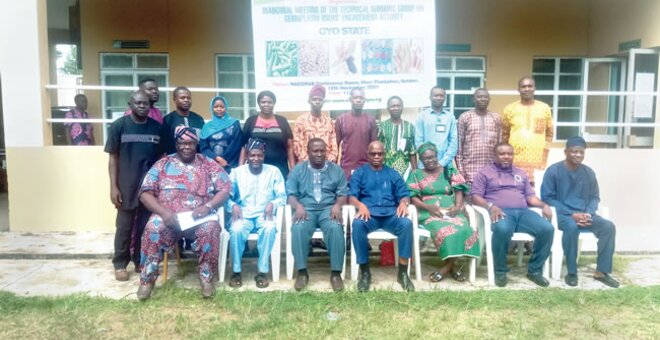Banking on African heritage
At a glance
The Seeds for Resilience Project supports five national genebanks in Africa to conserve, share and use their collections of key crops to build more resilient and diversified food production.
PROJECT TITLE: National Seed Collections for Climate-Resilient Agriculture in Africa
HIGHLIGHTS FROM 2022: "Standard operating procedures” were documented for acquisition and safety duplication; motor vehicles were delivered to the national genebank of Ghana and Nigeria; procurement of laboratory and information-technology equipment was initiated; operations backlogs continued to be addressed; activities with germplasm users are in full swing.
IMPLEMENTING PARTNERS: The Ethiopian Biodiversity Institute (EBI); the Plant Genetic Resources Research Institute (PGRRI) of the Council for Scientific and Industrial Research, Ghana; the Genetic Resources Research Institute (GeRRI) of the Kenya Agricultural and Livestock Research Organization; the National Centre for Genetic Resources and Biotechnology (NACGRAB) of Nigeria; and the National Plant Genetic Resources Centre (NPGRC) of the Zambia Agricultural Research Institute.
FUNDING PARTNER: Government of Germany (BMZ), through the German Development Bank (KfW).
Upgrading physical infrastructure…
Much-needed vehicles have now been procured for the genebanks in Ghana and Nigeria. It proved challenging to identify suitable suppliers for other components of the upgrading program, including the air-conditioning and refrigeration systems for the genebanks’ cold- and drying-rooms and computer equipment. However, in late 2022, a supplier was finally found that is capable of delivering all the computer equipment, accessories and consumables required by all five genebanks to properly implement their information management systems. Deliveries are expected in 2023.
…and supplies
Reviews of the partner genebanks observed that the aluminum foil packets available on local markets did not meet the quality standards required for use in genebanks. In 2022, the project therefore ordered foil packets in bulk from the company that supplies many international genebanks. NACGRAB was the first genebank to receive them in December 2022, with the other genebanks expected to receive their deliveries in early 2023.
Training in a new genebank information system
The project is working with the partner genebanks to implement GRIN-Global Community Edition (GGCE), a new genebank information management system. Training was provided to staff from all five genebanks in 2022 using an online platform developed for the project, and all five have now successfully uploaded data on selected seed samples to the new system. The project also conducted training on the latest version of the Multi-Crop Passport Descriptors —a standard commonly used to share information about genebank holdings.
Publishing data on Genesys
The adoption of GGCE is also helping the genebanks publish their sample-level data on Genesys, the online platform that provides access to information about crop diversity conserved in genebanks worldwide. The genebanks in Zambia and Ghana have taken the opportunity to include digital object identifiers (DOIs) on their holdings—the “gold standard” for tracking things on the Internet— and the other genebanks are expected to follow suit.
Back to school and hands-on training
In April 2022, Seeds for Resilience finally managed to shrug off the strictures of the COVID-19 pandemic and hold face-to-face workshops.
The first was held at the International Institute of Tropical Agriculture (IITA) in Ibadan, Nigeria, in late April. This brought together 11 participants from the partner genebanks—two each from Ethiopia, Ghana, Kenya and Zambia and three from Nigeria—and 12 experts from IITA as well as Crop Trust staff. In May, the Genebank Operations and Advanced Learning (GOAL) workshop in Kenya took place, with a larger group—41 participants and trainers—gathering in Nairobi to share their knowledge and experience.
Both workshops consisted of a mix of classroom-based sessions, tours of international genebanks and hands-on activities. The aim was to give the participants an opportunity to see different ways to manage genebank collections and to make crop diversity available to key users, such as plant breeders and farmers.
The diverse topics covered included quality management systems (QMS), communications, data management, as well as building and strengthening relationships with users. One session focused on how best to work with farmers in selecting varieties that meet their production and food needs.
During both workshops, the participants toured national and international genebanks. At IITA’s Genetic Resources Center, they visited laboratories and field collections, including of cassava and yam. The visit to the World Agroforestry (ICRAF) genebank featured a hands-on session on seed viability testing, which complemented a virtual presentation by Fiona Hay of Aarhus University in Denmark on the theory behind seed storage. In addition, participants learned about and tested the Field Book app, a mobile and tablet application that simplifies collecting data on such traits as the color of seeds and the shape of leaves.
But it was not all a one-way exchange of knowledge and information. The participants also presented their own approaches to the various activities covered, which led to some lively discussions.
The project also sponsored the participation of staff from three of the partner genebanks—Ghana, Kenya and Zambia—in a training course organized by the World Vegetable Center in Tanzania in October 2022. Topics included: the regeneration of Solanaceae (e.g. tomatoes, eggplants), Malvaceae (e.g. cotton, hibiscus), Cucurbitaceae (e.g. pumpkins) and Amaranthaceae (e.g. amaranth) species; how to run field trials; as well as conservation genomics. Private companies such as Rijk Zwaan, the fourth-largest global vegetable breeding company in the world, contributed their expertise to the course.
“These meetings and courses are a key part of the Seeds for Resilience approach,” said Nora Castañeda, manager of the project. “We are building a community of genebank professionals that will last long after the project ends. We hope that the exchange of knowledge and ideas will continue, and contribute to the generation of new approaches that are adapted to the needs of genebanks in Africa and elsewhere in the world, as well as a new generation of genebank staff.”
“It is wonderful—and vital to the success of the project—for all of us to be able to get together and share our knowledge, and how we approach the problems we face in our day-to-day activities,” she added. “We are all looking forward to building on the experience.”
And not just face-to-face
The project also conducted several online training events, including sessions on safety, health and environmental assessments. They also covered key points to be considered when preparing safety duplicates for dispatch to the Svalbard Global Seed Vault.
Quality management systems intensives
The Project held four “QMS Intensives” in 2022: in Kenya and Zambia in May, in Ghana in October and in Nigeria in November. These sessions assisted genebank staff in further developing and documenting standard operating procedures for key tasks; validated protocols against known standards; reviewed common problems and offered suggestions on how to solve them; assisted in addressing review recommendations; and improved the overall workflow and efficiency in the genebank.
Clearing operational backlogs
All of the partner genebanks made progress in clearing operational backlogs during the year, including in seed viability testing and regeneration. Several of the genebanks adopted new protocols for seed viability testing to meet the data requirements of GGCE. Regeneration proceeded apace in several genebanks: 934 barley, 342 sorghum and 128 faba bean accessions were regenerated by EBI; 1,841 sorghum, 385 pigeonpea, 181 cowpea and 243 green gram accessions were regenerated by GeRRI; and 129 cowpea, 58 bean and 263 sorghum accessions were regenerated by NPGRC.
Increasing use of genebank collections by farmers, plant breeders and researchers
Another core element of the project is to enhance the use of crop diversity conserved in the partner genebanks. It has been working with the genebanks to develop user groups and to identify crops that help diversify farmers’ production systems. This work has included providing advice and training on concepts, approaches and processes to increase collaboration with and within user groups. It has also covered more technical aspects of evaluating field trials and enhancing seed production and dissemination. All of the genebanks have now established user groups and have developed workplans for engaging with them.
In 2022, project consultants visited the genebanks in Ghana, Nigeria and Zambia to coach and advise partners in the use of participatory tools to engage with farmers. All of the genebanks are carrying out on-farm trials to evaluate materials from their collections in collaboration with farmers. These trials have identified diversity of particular interest to different groups of farmers, and plans are being implemented to multiply these materials for use by farmers.
Telling their story
Partners are increasingly engaging the local press in their countries and started developing Flickr albums to illustrate promotional materials such as brochures and web pages. A photographer visited Zambia and Nigeria to document some of the work conducted there and to provide training to the staff of partner genebanks.
Communications activities by project partners in 2022 included farmer field days, radio programs, video documentaries, newsletters, banners and posters, and engaging with both local and international media.
Related news
Seeing is Believing
Africa is facing the combined challenges of climate change, malnutrition and a rising population. Farmers on the continent urgently need access to crops that are more productive and nutritious, more resilient to unpredictable...
10 Mar 2022
NACGRAB and Crop Trust Move to Boost Use, Management of Germplasm Collections for Crops Production
THE National Centre for Genetic Resources and Biotechnology (NACGRAB), in collaboration with Global Crop Diversity Trust, have begun move to improve the use and management of germplasm collections through multi-stakeholder...
16 Nov 2021





